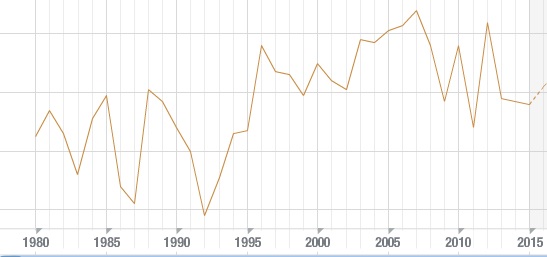Top Protectionist Countries, AI Go and China in Africa
This week at International Need to Know while political eyes shift from one state’s corn fields to another’s granite quarries, we focus on the world’s largest protectionists, computers playing ancient board games and one possible cause of slowing growth in Africa. Welcome to this week’s edition of International Need to Know, your go-to place for understanding this mixed-up, muddled-up planet we call home.
Without further ado, here’s what you need to know.
The World’s Top Protectionist Countries
Ever since Smoot met Hawley for an American-made beer (unbeknownst to them served in Irish-blown glass) in some dark corner of Washington, D.C., economists have warned of the dangers of protectionism.* But who are today’s greatest protectionists? The Economist Intelligence Unit lists the top ten countries with the most protectionist policies among the G-20 major economies. Your mileage on their methodology may vary.
1. Russia
2. Argentina
3. India
4. Brazil
5. Indonesia
6. Germany
7. USA
8. Japan
9. China
10. Italy/UK
*What? You don’t believe Smoot and Hawley drank beer in Irish-made glass?
Go Dog Go
Last week we noted in passing (no pun intended) that artificial Intelligence pioneer Marvin Minsky died. In what perhaps could be a sign of intelligence in the universe, a significant milestone in AI was achieved that same week when for the first time a computer beat a highly ranked player in the ancient Chinese Board game, Go.Bloomberg tells us that Jon Diamond, the head of the British Go Association (not to be confused with the UK Go Go Association), didn’t think this would happen for another five to ten years, “It’s really quite a large, sudden leap in strength,” he said. In addition to it happening sooner than we humans expected, the other significance of this milestone is how the computer achieved the victory. Computers beating humans in chess is done through brute processing power. However, Go, which has 200 choices per move, is more complicated than chess in which there are only 20 choices per move. In playing Go, the computer won through the use of neural networks that learned from human players and then gained further knowledge by playing itself a multitude of games. Such a learning process lends itself to applications in disciplines perhaps more useful than playing Go, such as health care, economics and autonomous vehicles. Last week’s victory was against the 675th ranked player in the world (INTN is ranked 70,567,356th). A bigger test looms. In March, the computer will play the world’s best human player in a match that will take place in Seoul, Korea. We here at INTN will be watching.
File Under Correlation or Cause?
In 2015, Africa’s GDP grew at its lowest rate since 1995. The continent’s GDP growth rate was only 3.6% last year. According to the Washington Post, “China accounts for more than 40 percent of exports in more than a half-dozen African countries, including Zambia, Angola, and Sierra Leone.” How much is China’s economy slowing? How much is that affecting Africa? These are not unrelated questions.
Africa’s GDP Growth



Leave a Reply
Want to join the discussion?Feel free to contribute!